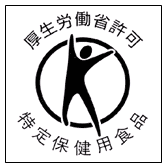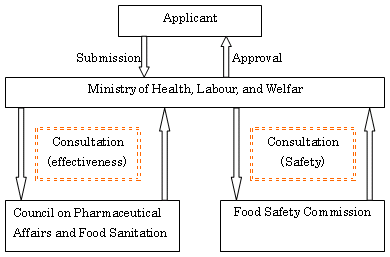FOSHU refers to foods containing ingredient with functions for health and officially approved to claim its physiological effects on the human body. FOSHU is intended to be consumed for the maintenance / promotion of health or special health uses by people who wish to control health conditions, including blood pressure or blood cholesterol. In order to sell a food as FOSHU, the assessment for the safety of the food and effectiveness of the functions for health is required, and the claim must be approved by the MHLW.

Seal for FOSHU Approval
Requirements for FOSHU Approval
| • | Effectiveness on the human body is clearly proven | |
| • | Absence of any safety issues (animal toxicity tests, confirmation of effects in the cases of excess intake, etc.) | |
| • | Use of nutritionally appropriate ingredients (e.g. no excessive use of salt, etc.) | |
| • | Guarantee of compatibility with product specifications by the time of consumption | |
| • | Established quality control methods, such as specifications of products and ingredients, processes, and methods of analysis |
In addition to "regular" FOSHU, following types of FOSHU are available.: Qualified FOSHU and Standardized FOSHU were introduced to facilitate applicants for FOSHU approvals.
| (1) | Qualified FOSHU: Food with health function which is not substantiated on scientific evidence that meets the level of FOSHU, or the food with certain effectiveness but without established mechanism of the effective element for the function will be approved as qualified FOSHU. |
|
| (2) | Standardized FOSHU: Standards and specifications are established for foods with sufficient FOSHU approvals and accumulation of scientific evidence. Standardized FOSHU are approved when it meets the standards and specifications. |
|
| (3) | Reduction of disease risk FOSHU Reduction of disease risk claim is permitted when reduction of disease risk is clinically and nutritionally established in an ingredient. |
Approved FOSHU Products (LINK: Japanese Only)
| Specified Health Uses | Principal Ingredients (ingredients exhibiting health functions) |
| Foods to modify gastrointestinal conditions | Oligosaccharides, lactose, bifidobacteria, lactic acid bacteria, dietary fiber 8 ingestible dextrin, polydextrol, guar gum, psyllium seed coat, etc.) |
| Foods related to blood cholesterol level | Chitosan, soybean protein, degraded sodium alginate |
| Foods related to blood sugar levels | Indigestible dextrin, wheat albumin, guava tea polyphenol, L-arabiose, etc. |
| Foods related to blood pressure | Lactotripeptide, casein dodecaneptide, tochu leaf glycoside (geniposidic acid), sardine peptide, etc. |
| Foods related to dental hygiene | Paratinose, maltitiose, erythrytol, etc. |
| Cholesterol plus gastrointestinal conditions, triacylglycerol plus cholesterol | Degraded sodium alginate, dietary fiber from psyllium seed husk, etc. |
| Foods related to mineral absorption | Calcium citrated malate, casein phosphopeptide, hem iron, fracuto-oligosaccharide, etc. |
| Foods related to osteogenesis | Soybeen isoflavone, MBP (Milk basic protein), etc. |
| Foods related to triacylglycerol | Middle chain fatty acid, etc. |
Approved Reduction of Disease Risk Claim
| - | Calcium and Osteoporosis: "Intake of proper amount of calcium contained in healthy meals with appropriate exercise may support healthy bones of young women and reduce the risk of osteoporosis when aged." | |
| - | Folic Acid and Neural Tube Defect: "Intake of proper amount of folic acid contained in healthy meals may support women to bear healthy baby by reducing the risk of neural tube defect, such as spondyloschisis, during fetal development. |
Flow Chart of FOSHU Approval
